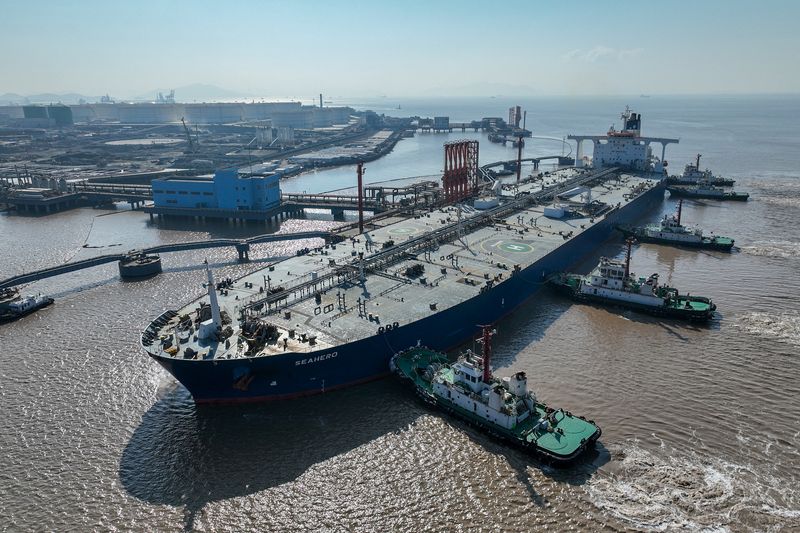By Arunima Kumar
(Reuters) -Oil prices rose more than 1% on Monday, supported by strong factory activity in China, the world’s second-largest oil consumer, and escalating tensions in the Middle East, where Israel resumed attacks on Lebanon despite a ceasefire deal.
Brent crude futures climbed 84 cents, or 1.17%, to $72.68 a barrel by 1203 GMT while U.S. West Texas Intermediate crude was at $68.79 a barrel, up 79 cents, or 1.16%.
“The better-than-expected economic data from China is supporting crude prices, as so far oil prices were suffering from Chinese demand concerns,” said Giovanni Staunovo, an analyst with UBS.
Stimulus measures are starting to finally impact economic activity, and that should help Chinese oil demand over the coming months, he added.
A private-sector survey showed China’s factory activity expanded at the fastest pace in five months in November, boosting Chinese firms’ optimism just as U.S. President-elect Donald Trump ramps up his trade threats.
Still, traders are eyeing developments in Syria, weighing if they could widen tension across the Middle East, said Yeap Jun Rong, market strategist at IG.
A truce between Israel and Lebanon took effect on Wednesday, but each side accused the other of breaching the ceasefire.
The Lebanese health ministry reported multiple injuries from two Israeli strikes in south Lebanon, while air strikes intensified in Syria as President Bashar al-Assad vowed to crush insurgents in Aleppo.
Last week, both crude benchmarks fell more than 3% on easing supply concerns from the Israel-Hezbollah conflict and 2025 surplus forecasts, despite expected sustained output cuts.
The Organization of the Petroleum Exporting Countries and their allies, known as OPEC+, postponed its meeting to Dec. 5 and is discussing delaying a planned oil output increase scheduled to start in January, OPEC+ sources told Reuters last week.
“Attention will be on the potential delay of the planned production hike, as an indefinite delay could alleviate downward pressure on prices,” said George Pavel, general manager at Naga.com Middle East.
This week’s meeting will decide policy for the early months of 2025.

“Money managers are sitting on the fence…the market is looking for clarity between the implication of the forthcoming Trump administration and OPEC+ supply policy when the group meets,” said Harry Tchilinguirian, head of research at Onyx Capital Group.
Brent is expected to average $74.53 per barrel in 2025, a Reuters monthly oil price poll showed on Friday.



